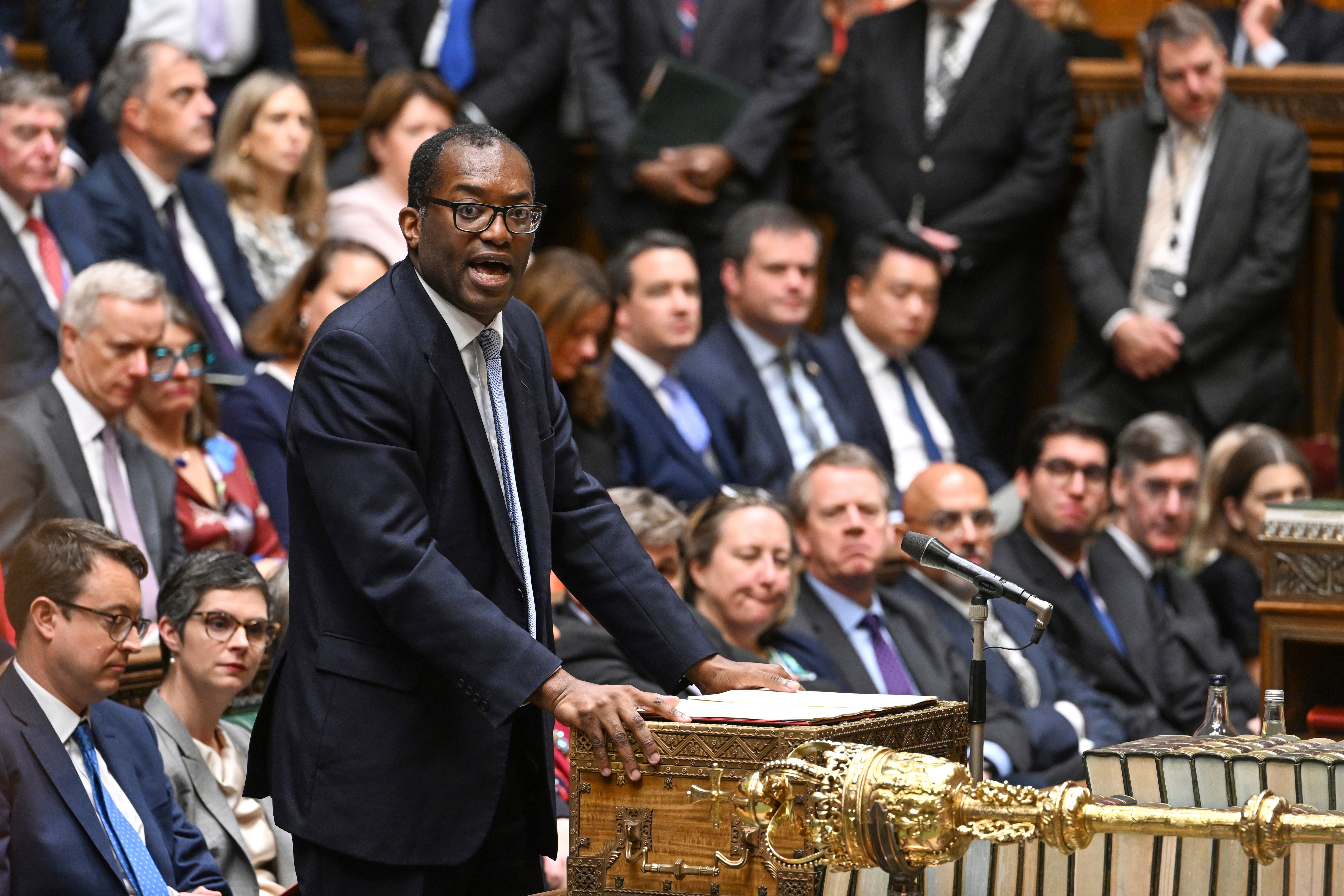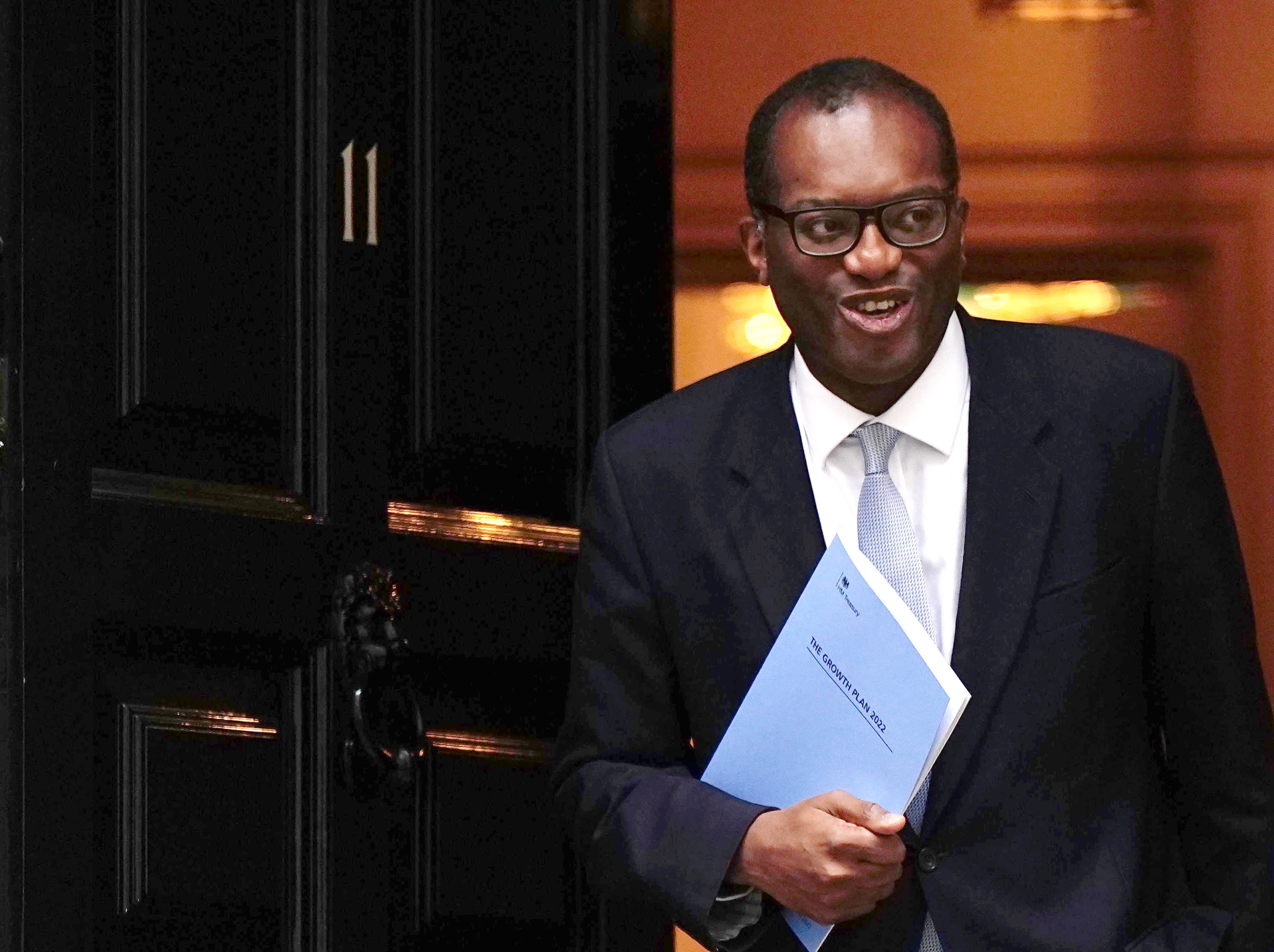With Kwarteng’s mini-Budget the government has made an almighty gamble
Sidelining spending watchdog has ramped up market fears about UK’s finances

This was presented as a pro-business mini-Budget by Kwasi Kwarteng. But that is not how it is being received in some boardrooms across the City.
Instead, there is growing concern about the fiscal risks presented by Mr Kwarteng’s radical, big-borrowing bet.
Not only did the chancellor announce that measures to combat the surge in energy prices – expected from any government – would cost £60bn in the first six months, but he also made huge additional tax cut commitments, estimated to be worth around £45bn.
The move is unlikely to offer a growth boost large enough to make the tax cuts – the largest since 1972 – pay for themselves, according to some senior officials at the Treasury and spending watchdog the Office for Budget Responsibility (OBR).
Their private views echo on-record words of the OBR’s chief of staff, Andy King, from July before these fresh measures were announced: “Tax cuts don’t pay for themselves and would not improve the long-term financial position.
“In every case I can think of, when we look at tax cuts, the direct fiscal cost of cutting that tax outweighs the indirect fiscal benefit of improved economic activity.”
What is causing consternation, across the political and economic spectrum, is the chancellor’s side-lining of the OBR, only promising to publish a full economic forecast before the end of the year, with a second to follow in the new year.

One reason why, in recent years, the UK has been able to borrow at attractive rates, is that the OBR has significant international credibility. Its assessment of the public finances allows investors to see, alongside debt issuance – the Debt Management Office (DMO) raising money from the market in order to fund government spending, exactly how sustainable that borrowing was.
But Mr Kwarteng decided to press ahead without this layer of scrutiny. That means the government has instructed the DMO to raise money, but without a clear OBR examination, adding to concern in markets.
It would have been hard for the OBR to do a full costing, as there were some very large last-minute tweaks, but it could have offered some grounding: a good sense of what these figures mean in context, according to people familiar with its processes.
Even if the OBR had offered a troubling assessment, one fixed income (bond) investor told The Independent it would have been more reassuring than nothing at all. It would have calmed some nerves by showing the government had the confidence of its convictions enough to allow “proper, robust scrutiny”, they said.
“This all smells of panic. Any government has to spend big to combat energy costs right now, but this race to slash tax shows raw panic about the lack of business investment in the UK. In fact, it is likely to deter, rather than boost inward investment. Crashing the pound is not going to encourage investment,” they added.
Even the business lobby group, the Institute of Directors, voiced some alarm, even as it welcomed some tax cuts, saying that it was “concerned that the chancellor had not asked the OBR to undertake its usual independent assessment of the impact of its proposals on government debt and the wider macro-economy”.
“Without this, neither businesses nor parliament have the reassurance that the scale of this intervention is affordable and so does not jeopardise overall economic stability,” it said in a statement.
Investors did not offer a vote of confidence either. Yields on UK government bonds rose sharply, a signal that investors are now less happy to hold UK government debt. The pound fell to a fresh 37-year low against the US dollar and also dropped against the euro, suggesting it is a weakening of sterling, not just a stronger dollar, moving currency markets.
These are not market shifts that suggest investors expect the government’s significant gamble to pay off any time soon.
It is true that businesses rarely beg to face higher taxes, but several senior business figures told The Independent that they would rather have regulatory certainty, political stability and economic security instead.

Business leaders do not want a dash for growth if it means the next government is then forced to raise taxes sharply in order to stabilise the public finances. Today’s gamble has added to the risk this is needed within the next three years, in some bosses’ views.
One board member of a US-listed company with a large presence in the UK compared today’s not-so-mini-Budget to the “Mad Max race” to secure a trade deal with India that puts the UK’s regulatory standards in question.
They do not want, as present, engagement with the government to involve constant questions about what regulations ought to be scrapped when these rules are part of international standards.
“Much of what is termed red tape fit for a bonfire are rules similar or the same as any we have to meet to trade internationally, irrespective of British decisions,” one chief executive of a FTSE 100 firm told The Independent.
“In theory, making it easier to pay top staff really good salaries by lowering taxes is welcome, but if I had a choice of a big, expensive government change, I’d rather have a functional Home Office so it was easier to sort visas for international talent,” they added.
Inflation is partly being fed by a very tight labour market, amid an ageing population and growing evidence of worsening public health.







Join our commenting forum
Join thought-provoking conversations, follow other Independent readers and see their replies
Comments